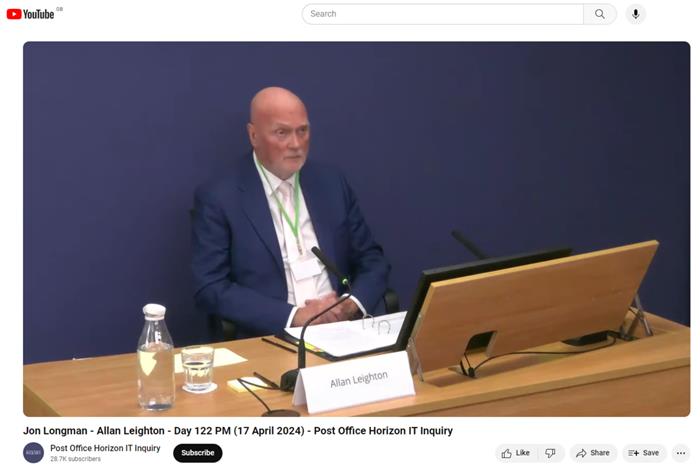A former chair of Royal Mail, the parent company of the Post Office mired in the Horizon accounting scandal, has resisted a suggestion he was “overboarded” and said corporate governance codes were applied while he was on the board.
Allan Leighton, chair of Royal Mail from 2002 until 2009, was attending the public inquiry into how using Horizon, a faulty accounting software system, could have led to the wrongful prosecution of more than 900 sub-postmasters between 1999 and 2017. Horizon was introduced to handle accounting and over-the-counter transactions from 1999.
Leighton told the inquiry that no member of staff during his time at the company said “anything” that would give rise to “suspicion” that the accounting generated by Horizon was unreliable.
But when questioned by Inquiry counsel Sam Stevens on the number of board roles that he held during his time at Royal Mail, Leighton insisted he dedicated appropriate time to his Royal Mail duties. Leighton said he worked “full time”—for him six days a week—and “nearly every day” he would work on Royal Mail matters, including site visits.
“So, I want to be very, very clear that I absolutely spent the time that I required to spend on the Royal Mail and on Post Office Limited,” Leighton said.
“I don’t take on any roles that I don’t think that I can commit the time to and I think my reputation whilst in the Royal Mail was probably of the most visible and accessible chair that there’d been.”
Pushed by Stevens on whether he was overboarded, Leighton said: “I would repeat what I’ve just said. I worked full time, long hours, very hard and I never take on any role that I don’t think I can put the time to that I need to.”
Governance perspective
In other questioning, Leighton said Post Office Limited had applied governance codes.
“I mean,” he said, “in the broadest sense, yes, that’s what we did.” He added: “I would say that all of the boards [across the Royal Mail group] from a governance perspective, from a corporate governance perspective, I think were very much in line with some of that code.”
Leighton went on to say that “certainly in my experience, all those businesses were set up from a governance perspective in completely the right way.”
Asked if it was the Financial Reporting Council’s (FRC) Combined Code of Corporate Governance, Leighton conceded: “Probably. I don’t remember it in that detail.”
The Cadbury Report, a forerunner to today’s corporate governance code, was published in 1992. The first ‘combined code’ followed in 1998 and was then given its first revision in 2003 by the Financial Reporting Council. The code is now known as the UK Corporate Governance Code.
Leighton answered questions on the role of the general counsel at Royal Mail, audit and internal audit, risk management and whether the group structure during his time as chair could have prevented information flowing from subsidiaries, such as the Post Office, to the group board. “No. No, I don’t,” he said.
Leighton was also questioned about the Post Office’s ability to both investigate and prosecute cases of suspected fraud among sub-postmasters.
Leighton said he did not question this function of the Post Office at the time, but added: “Today I don’t believe the way that it was operated should happen, and the reason I don’t believe it should is because it obviously had flaws in it.”
Lack of data
There were also questions on whether the Royal Mail board was receiving information on the number of prosecutions undertaken by the Post Office. The Royal Mail board appeared to have received some data on prosecutions, particularly for issues such as theft from sorting offices.
Inquiry chair Sir Wyn Williams said he had so far seen no minutes of the Post Office board detailing prosecution numbers.
Leighton said that “if that information had been available, then I think that would have helped.”
In his written witness statement, Leighton wrote: “In hindsight, a greater level of data regarding labour turnover, accompanied by details on why employees were exiting, may perhaps have helped to establish what was happening to SPMs [sub-postmasters].
“However, SPMs were not employees of the Post Office or Royal Mail and so I expect that the data would not have been available, nor would the board have expected to receive such data.
“Further, more detailed reports regarding the Royal Mail group’s prosecutions, ideally divided by subsidiary and role, would have been helpful in perhaps flagging the patterns which emerged but there is no guarantee that these would have been brought to the attention of the relevant individuals.”
The hearing continues. Allan Leighton is expected to return to give further evidence.





